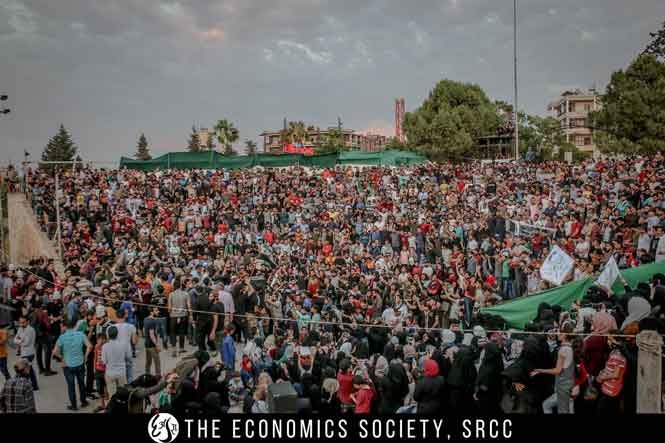By civil society, it is usually meant citizens as the third sector besides government and business. The Civicus International—a global alliance dedicated to strengthening citizen action for a socially just and rights-based recovery—has broadened civil society to include civil society networks and organizations, trade unions, faith-based networks, professional associations, NGO capacity development organizations, philanthropic foundations and other funding bodies.
In the contemporary universal reality of politics not caring for ordinary people and the latter losing trust in politics, a new trend of “citizens’ assemblies” and other deliberative groups has emerged in some countries to connect and debate and create shared solutions so that politics is in touch with the people. The Civicus International’s role too is exemplary in this regard. All this augurs well for answering the questions of the people that the politicians of the left, right and centre have failed to address.
The State of Civil Society Report 2020 brought out by the Civicus International has got a wealth of ideas that can help us make this better world, and a great diversity of civil society actions that are already trying to build it.
This Report informs us of 2019 as the year when civic action, including that mobilised by Civicus, achieved significant impact in securing progressive change, advancing demands for civic rights and democratic freedoms, fairer economic policies, an end to inequality, action on the climate crisis and international reform.
A great wave of protests broke across the world during 2019—in Colombia, Hong Kong, Chile, Lebanon, Kazakhstan, Thailand, Sudan, Iraq, Ecuador, Russia, Algeria, Puerto Rico and India, to mention a few countries. Protests and other civil society actions took place against a backdrop of continuing civic space restrictions and growing anti-rights backlash linked to ultra-conservative faith communities that were well-resourced, strategically enmeshed with government structures and politically connected at the highest levels. The resurgence of anti-rights discourse has made harder the everyday lives of migrants, refugees, members of religious minorities, LGBTQI+ people, women and many others. The weakening of international institutions such as the UN by authoritarian states and regressive leaders has made it easier for the anti-rights groups and politicians to gain access and influence, allowing them to dispute non-negotiable universal human rights. Alongside, economic power disparities have been reinforced with the ascendancy of the private sector of powerful business interests to the commanding heights.
All of the protests of 2019 carried the conviction that democracy requires free and fair electoral competition, the availability of genuine alternatives, respect for minority and dissenting opinions and the opportunity to debate a range of viewpoints before reaching informed decisions.
Another major 2019 mobilisation trend saw people driven to protest by economic hardship and pressing financial concerns. And strikingly, in many of these protests, people joined forces across a variety of longstanding divides—gender, age, social class, religion, ethnicity—understanding that what they shared was stronger than what set them apart. This was important because it prevented political leaders from appeasing and splitting off some groups from the mass of protesters, and communicated that protest demands came from across the population. More importantly, by coming together, people often achieved significant impact. However, many protests continued after their immediate causes were addressed because people began to demand deeper and longer-lasting change.
2019 was also the year when civil society pushed climate change as also gender-based violence and LGBTQI+rights into the headlines and made it part of everyday conversation. Around the world, the youth-led global school strike movement, Extinction Rebellion and countless environmental and indigenous movements demanded that decision-makers recognize and pay attention to the scale of the climate emergency and take action to prevent the worst impacts before it is too late. Non-violent direct action and civil disobedience characterized the expression of dissent in this regard. There was a definitive civil society mobilization against the trend of right-wing populism and nationalism that brings with it many attacks on civil society and exclusion of groups. And in contrast with the strongman, macho leadership style associated with right-wing populism and nationalism, several young female leaders emerged with some of them having a history of civil society activism. Noteworthy are the women who rose to power in Finland, New Zealand and Slovakia, whose leadership style emphasizes empathy, rationality, fairness, collaboration and the recognition of rights.
In many contexts, no longer prepared to be relegated to supporting roles, women forced their way onto the frontlines and became the public face of protests for more and better democracy, fairer economic and social policies and climate action. These women protesters were young, a fact that pointed to the emergence of the leading role of young people in movements for change for factoring in demands for women’s equal representation and rights, sexual and reproductive rights and an end to gender-based violence. A new civic generation is thus rising, showing the power that can be unlocked through personal activism, creative engagement and decentralized coordination. This is the most optimistic trend captured by the Civicus International 2020 Report.
In the current context of coronavirus, the Civicus International has called for measures to protect public health without disrespecting human rights. It has also called for rethinking as to how economies are structured based on neoliberal policies and market fundamentalism; human rights approach to reach the most disadvantaged/excluded groups the first; freeing of multilateral institutions such as the WHO from the influence of the powerful states, self-serving leaders and the profit-driven motivations of big business; and ramping up action on climate change.
In light of the above, college students must keep looking at the findings presented in the CIVICUS Monitor—the online platform of the Civicus International, that tracks the conditions for civil society in 196 countries.
By Annavajhula J.C. Bose, PhD
Department of Economics, SRCC
REFERENCES
The Economist. 2020. Politicians Should Take Citizens’ Assemblies Seriously. September 19.
www.civicusinternational.org



